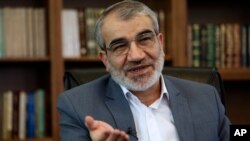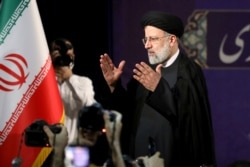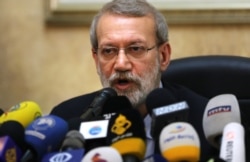Iran’s election watchdog has approved seven candidates for the country’s June 18 presidential election, including judiciary chief Ebrahim Raisi, while disqualifying several prominent figures.
Raisi is the most well-known of the candidates allowed to run by the Guardian Council, and is a close ally of Supreme Leader Ayatollah Ali Khamenei.
State television said the other candidates include former nuclear negotiator Saeed Jalili, former Revolutionary Guard commander Mohsen Rezaei, former lawmaker Ali Reza Zakani, lawmaker Amir Hossein Ghazizadeh, former provincial governor Mohsen Mehralizadeh, and the current head of Iran’s Central Bank Abdolnasser Hemmati.
The council barred former parliament speaker Ali Larijani, a conservative who had allied with President Hassan Rouhani, from running.
It also disqualified pragmatist First Vice President Eshaq Jahangir, as well as former hard-line President Mahmoud Ahmadinejad.
The approval of Raisi’s candidacy is likely to bolster his chances of an election win. He gained support from his anti-corruption campaign, according to opinion polls, and is believed to be a preferred choice of Supreme Leader Khamenei.
Of the 600 people who registered, 40 people met the Council’s basic criteria, with only seven being approved.
Jahangir, a Rouhani ally, said the disqualification of him and “many qualified people [is] a serious threat to public participation and fair competition among political tendencies, especially reformists,” according to local media.
Candidate Raisi also objected to the large number of disqualifications, tweeting, “Since yesterday evening, when I was informed of the results ... I have made contacts and I am holding consultations to make the election scene more competitive and participatory.”
Larijani, however, accepted his disqualification, saying in a tweet that “Now that the election process has been conducted in this way, I have done my duty before God and my dear nation.”
Candidates in Iran operate in a political landscape consisting broadly of hardliners who support expanding the country’s nuclear program, moderates who want to maintain the status quo and reformists who want to transform the theocracy internally.







